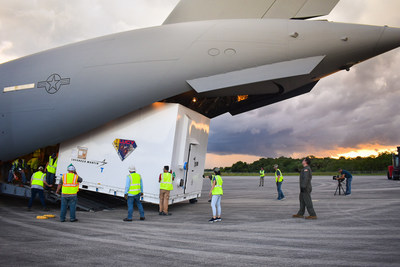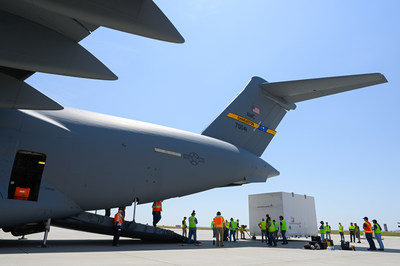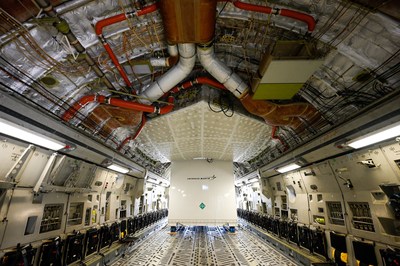NASA's Lucy Spacecraft Begins Launch Preparations
NASA's Lucy spacecraft has arrived at Kennedy Space Center, Florida, to prepare for its upcoming launch this fall. Lockheed Martin, who designed and built Lucy, aims to explore Jupiter's Trojan asteroids, which may provide insights into the solar system's formation. Following a successful transport from Colorado, where it was carefully handled by engineers, Lucy will undergo pre-launch tests and is scheduled for liftoff on an Atlas V 401 rocket. The mission will include flybys of eight asteroids over a journey of 12 years, offering a unique scientific opportunity.
- Successful transport of Lucy spacecraft from Colorado to Kennedy Space Center.
- Lockheed Martin's role in building and operating Lucy enhances its reputation in aerospace.
- The mission promises significant scientific discoveries about the solar system's formation.
- None.
Insights
Analyzing...
DENVER, Aug. 2, 2021 /PRNewswire/ -- NASA's Lucy spacecraft has officially arrived at Kennedy Space Center, Florida, to begin preparations ahead of its launch this fall.
"This spacecraft is so much more than a piece of hardware, it's a work of art, and I'm incredibly proud of how the team came together to build this through a global pandemic," said Rich Lipe, Lockheed Martin Lucy program manager. "To be here now, starting to prepare for launch, is a terrific feeling."
Designed and built by Lockheed Martin for NASA, Lucy will give humankind its first ever close-up look at Jupiter's elusive Trojan asteroids. These celestial objects are important because scientists believe they could hold clues about how our solar system and the planets formed.
Shipping a Precious Package
In the pre-dawn hours Friday, Lucy took the first steps of its 12-year, four-billion-mile odyssey to the "fossils" of the solar system by boarding a cargo plane in Colorado.
And moving a nearly one-ton spacecraft 18 months in the making is no small feat.
After converting a shipping container into its own mini cleanroom environment, a team of Lockheed Martin engineers carefully placed Lucy inside and loaded the spacecraft onto a special transport truck at the company's Littleton, Colorado, facility.
Flanked by its own police escort, the truck made its way to Buckley Space Force Base in Aurora, Colorado, where a team of about 40 people from Lockheed Martin, NASA and Southwest Research Institute met Lucy and tucked the spacecraft safely inside its C-17 transport aircraft.
After touching down on the Space Shuttle Landing Strip at Kennedy Space Center, Lucy was moved to Astrotech Space Operations, where it will begin preparations for a 23-day launch window that opens Oct. 16.
What's Ahead in the Journey?
Following its pre-launch testing, launch vehicle integration and liftoff on an Atlas V 401 rocket, the path that lies ahead will see Lucy visit a record-breaking number of asteroids – eight, to be precise.
As part of a highly complex orbital trajectory, Lucy will fly by one Main Belt asteroid and seven Trojan asteroids – ancient objects trapped within gravity wells created by the combined pull of Jupiter and the sun, near so-called Lagrange Points. One group leads and one group trails Jupiter in its orbit.
The spacecraft will use precise instruments to study the geology, surface composition and physical properties of these primitive Trojan asteroids. Scientific theory hypothesizes these objects were scattered during the creation of our outer solar system roughly 4 billion years ago and later captured in Jupiter's orbit – remaining there, undisturbed, for billions of years.
These genuine "fossils" of the solar system could hold clues about what conditions were like when the planets formed, leading to an even greater understanding of our own origins.
Lucy's first asteroid flyby occurs in 2025, and the last planned flyby will be in 2033.
More About the Mission
For more than 50 years, Lockheed Martin has helped NASA explore every planet in our solar system and continues to develop new technologies for future space missions like Lucy.
Lucy is the seventh of 13 NASA Discovery-class missions in which Lockheed Martin has participated. The company will also build two NASA spacecraft headed to Venus at the end of the decade.
Lockheed Martin Space designed, built, tested, and will operate Lucy out of its Littleton, Colorado, facility. NASA's Goddard Space Flight Center in Greenbelt, Maryland, provides overall mission management, systems engineering and safety and mission assurance. Southwest Research Institute in Boulder, Colorado, is the principal investigator institution and will operate the Science Operations Center (SOC). Marshall Space Flight Center in Huntsville, Alabama, manages the Discovery Program for the agency's Science Mission Directorate in Washington, D.C.
Learn more about Lucy on Lockheed Martin's website. For photos, check out the company's Flickr page.
About Lockheed Martin
Headquartered in Bethesda, Maryland, Lockheed Martin (NYSE: LMT) is a global security and aerospace company that employs approximately 114,000 people worldwide and is principally engaged in the research, design, development, manufacture, integration and sustainment of advanced technology systems, products and services.
Please follow @LMNews on Twitter for the latest announcements and news across the corporation.
![]() View original content to download multimedia:https://www.prnewswire.com/news-releases/nasas-lucy-spacecraft-begins-launch-preparations-301346238.html
View original content to download multimedia:https://www.prnewswire.com/news-releases/nasas-lucy-spacecraft-begins-launch-preparations-301346238.html
SOURCE Lockheed Martin











